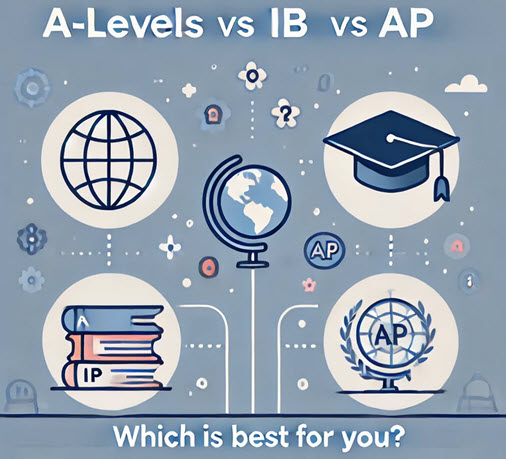Comparison of International Curricula: A-Levels, IB, and AP
Introduction When choosing an international curriculum, students and parents must consider several factors, including assessment methods, flexibility, subject depth, and global recognition. The most prominent international education systems include A-Levels, the International Baccalaureate (IB), and Advanced Placement (AP). This article explores the differences between these systems to help students make informed decisions.
1. Curriculum Structure and Subject Choices
| Feature | A-Levels | IB | AP |
|---|---|---|---|
| Subject Selection | Students choose 3-4 subjects | Fixed curriculum with 6 subject groups | Wide range of subjects; students choose individually |
| Flexibility | High, with in-depth study | Broad curriculum with core requirements | Moderate; students pick subjects independently |
| Core Requirements | No mandatory subjects beyond selected ones | Includes Theory of Knowledge, Extended Essay, and CAS (Creativity, Activity, Service) | No core requirements beyond exams |
- A-Levels allow for specialization, making them suitable for students with clear academic goals.
- IB promotes a holistic approach with interdisciplinary learning.
- AP provides subject-specific qualifications that are widely accepted by universities.
2. Assessment Methods
| Feature | A-Levels | IB | AP |
|---|---|---|---|
| Exam Structure | Modular or linear final exams | Continuous assessment + final exams | Single standardized exams per subject |
| Coursework Component | Some subjects require coursework | Extended Essay and Internal Assessments required | Minimal coursework |
| Grading Scale | A* to E | 1 to 7 | 1 to 5 |
- A-Levels emphasize final exams with some coursework in select subjects.
- IB includes coursework and internal assessments for a balanced evaluation.
- AP focuses on standardized exams, often without coursework.
3. University Recognition and Global Acceptance
| Feature | A-Levels | IB | AP |
|---|---|---|---|
| UK University Recognition | High | High | Moderate |
| US University Recognition | High | High | Very High |
| European University Recognition | High | High | Moderate |
| Flexibility for International Admissions | High | Very High | High |
- A-Levels are widely accepted in the UK and internationally, often required for direct university entry.
- IB is recognized globally and offers a balanced curriculum that appeals to many top universities.
- AP is favored by US institutions but also accepted worldwide.
Conclusion Each international curriculum has its strengths and suits different types of learners. A-Levels provide in-depth subject focus, while IB fosters a well-rounded education with research and extracurricular components. AP allows flexibility with individual subject selection. Understanding these differences can help students choose the best path based on their academic aspirations and future university plans.

